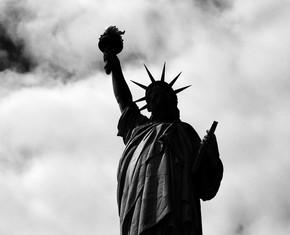The views expressed in our content reflect individual perspectives and do not represent the authoritative views of the Baha'i Faith.
In the Twentieth Century, both world wars were horrific examples of what war can do to people, villages, towns, cities and nations—killing them or blasting them to rubble.
But regardless of the warnings, war continues, on an area-wide basis instead of a global battle between protagonist and antagonist nations. Those nations fight proxy wars instead, making places like Syria suffer. Huge hostilities between nations still exist, replicating the conditions that led to the two world wars.
Did you know that in his day Baha’u’llah foretold the coming of World War I? In 1914, Abdu’l-Baha, Baha’u’llah’s son described it:
About fifty years ago, His Holiness Baha’u’llah proclaimed certain Teachings and raised the Song of Universal Peace. In numerous Tablets and sundry Epistles He foretold, in the most explicit language, the present cataclysmal events [WWI] stating that the world of humanity was facing the most portentous danger and asserting categorically that the realization of Universal War was unfortunately inevitable and unavoidable. For these combustible materials which were stored in the infernal arsenals of Europe would explode by contact with one spark.
Among other things, “the Balkans will become a volcano and the map of Europe will be changed.” For these and similar reasons He (Baha’u’llah) invited the world of humanity to Universal Peace. He wrote a number of Epistles to the kings and rulers and in those epistles He explained the destructive evils of war and dwelt on the solid benefits and nobler influences of Universal Peace. – Star of the West, Volume 4, p. 233, December 31, 1914.
Baha’u’llah passed to the next world on 29 May 1892, a full 22 years before the assassination of Archduke Franz Ferdinand of Austria in Sarejevo, the “spark” that set off that massive world war of carnage and death. Baha’u’llah proclaimed that the world would be engulfed in wars even before that, as early as the 1870’s, with his series of letters and tablets to the world’s kings and religious rulers.
Historians tell us that World War I ended with the signing of the Treaty of Versailles on 28 June 1919. But the United States Senate did not ratify the treaty despite public support for it, and did not formally end its involvement in the war until the Knox–Porter Resolution was signed on 2 July 1921 by President Warren G. Harding. For the nations of Europe, the shooting stopped, but the real hostilities did not end. They festered and grew until World War II broke out 23 years later.
And so it is with the world today. Many nations, or rather regions, live in a relative state of calm, but around them and elsewhere there may be war. The underlying feelings of hostility have not gone away. Huge numbers of armaments are still manufactured, stored and kept ready for use. The world is still an armed camp waiting for another spark.
It is obvious, then, that peace is not just a function of treaties. It is a function of our own peaceful beliefs and actions.
Abdu’l-Baha, speaking about the 1893 Chicago, Illinois, Columbian Exhibition and World’s Parliament of Religions, said this:
I hope that this Jubilee and this Exhibition may be celebrated in the utmost perfection so that the call to the world of unity, “There is no God but One God, and all the Messengers, from the beginning to the Seal of the Prophets (Muḥammad) were sent on the part of the True One!” may be raised; the flag of the oneness of the world of humanity be unfurled, the melody of universal peace may reach the ears of the East and the West, all the paths may be cleared and straightened, all the hearts may be attracted to the Kingdom of God, the tabernacle of unity be pitched on the apex of America, the song of the love of God may exhilarate and rejoice all the nations and peoples, the surface of the earth may become the eternal paradise, the dark clouds may be dispelled and the Sun of Truth may shine forth with the utmost intensity. – Tablets of the Divine Plan, pp. 78-79.
Surely, we all work, pray and hope for such a peaceful world in our own lives and the lives of others.
















Comments
Sign in or create an account
Continue with Googleor